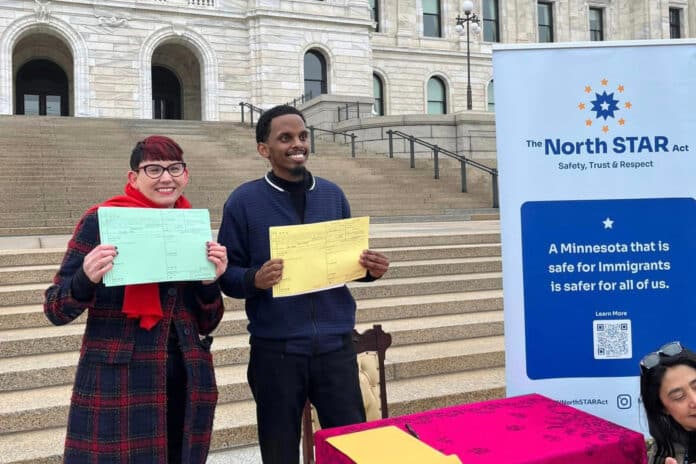
In the 2024 legislative session, Minnesota Democrats intend to keep working on behalf of illegal immigrants.
Democrats in the Minnesota Legislature plan to push a bill, first introduced in 2023, that would make Minnesota a “sanctuary state.” Authored by Rep. Sandra Feist, D-New Brighton, and Sen. Omar Fateh, D-Minneapolis, the so-called “North Star Act” would ban local law enforcement from assisting federal agencies in enforcing immigration law.
Specifically, state and local law enforcement, and other government employees, would be restricted from “cooperating with federal immigration enforcement efforts.”
However, a website dedicated to promoting the bill notes that it does not “prohibit collaboration on the basis of investigating criminal activity.”
“Immigration enforcement is the sole responsibility of the federal government. State law enforcement agencies do not have the legal authority to hold people on immigration detainers unless specially authorized to do so by the federal government, and the federal government cannot mandate compliance with immigration detainers. So state and local law enforcement can leave immigration to federal authorities while remaining in full compliance with state and federal laws. This frees up public safety resources for more appropriate ends,” that website says.
The North Star Act is supported by Democratic state legislators from Rochester to Minneapolis to Duluth. Advocates of the proposed law have set up a website and Facebook page to promote the legislation.
In a social media post, Feist said the bill would ensure state resources are not “wasted” on “enforcing our broken federal immigration laws.”
“In doing so, we will protect our immigrant neighbors and keep our communities whole. I’m incredibly proud and energized to be the chief House author of this critically important legislation,” she said, indicating that some changes have been made to the language of the bill since it was first introduced last year.
Feist and Fateh participated in a celebratory signing of the “bill jackets” for the North Star Act outside the Minnesota Capitol last week.
With Democratic majorities in both the Minnesota House and Senate, the North Star Act may become state law soon. Gov. Tim Walz previously indicated his own support for the idea when he ran for governor in 2018. Last year, Democrats approved legislation which allows illegal immigrants to obtain driver’s licenses, receive free college tuition, and access a state-run insurance program.
According to the Federation for American Immigration Reform, 11 states and the District of Columbia are “sanctuaries” for illegal immigrants. Republican Texas Gov. Greg Abbott has been transporting illegal immigrants who enter his state to self-proclaimed sanctuary jurisdictions.
Millions of migrants have poured into the United States during the country’s illegal immigration crisis. Cities and states all over America have been overwhelmed by the massive influx of immigrants. Furthermore, vast amounts of taxpayer dollars have been used to transport, house, and provide services to these illegal immigrants. Additionally, Minnesota’s only immigration court already has a record-breaking backlog of cases.
“This will incentivize more to come and increase the strain on our already overburdened health, welfare and education systems. Local and county officials are already asking for more [money] to meet current needs,” Rep. Kristin Robbins, R-Maple Grove, said in response to the bill.
Last month, a Somali terrorist was arrested in Minnesota after entering the country illegally through the southern border. Despite being detained by border officials after illegally entering the United States, the terrorist was released and allowed to freely roam the country for roughly a year.
Eventually, federal officials arrested the individual after determining he was a member of al-Shabaab, a Somali terrorist group.
















